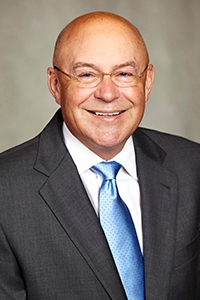Norman Borlaug Centennial Q&A's with Experts:
If Norman Borlaug posed the following questions to you... what would you tell him?

"The global food security challenge is so big and so complicated that it cannot
be solved by one category of organization."
Robert T. Fraley, Ph.D., 2013 World Food Prize Laureate
Executive VP and Chief Technology Officer, Monsanto,
United States
Q: What’s the one thing – the single most important – that we need to address to solve food insecurity?
A: Collaboration. The global food security challenge is so big and so complicated that not only can it not be solved by one organization -- it cannot be solved by one category of organization. It will require the efforts of the private sector, NGOs, governments, universities, foundations and research institutions. In addition, no one strategy will suffice. We’ll need to use a combination of precision farming, GMOs, advanced breeding, some of the organic farming techniques that conserve water and improve soil quality, and many others, including finding ways to reduce the amount of food we waste. Finally, I should note that if we are going to be able to collaborate in this way, we’ll need to listen to one another. We’ll need to identify the common ground that we have so that we can advance solutions together.
Q: Do you think we can feed 9 billion people by the year 2050? If so, why? If not, why not?
A: Personally, I believe we absolutely can do it. We definitely have the capability and the tools available to us. Our next steps are really identifying the ways that we can collaborate to make a difference and raise enough food for 9 billion on the footprint we use today. That’s important because – by not expanding the footprint – we can continue to improve the sustainability of the global agriculture system. And, if we’re successful we could actually reach a tipping point where we can think about reforestation and preservation of our lands and wetlands. But if we’re going to achieve that kind of increase in productivity, we’ll have to utilize all available tools that can support agriculture production.
Q: Within your area of expertise, what is one misunderstood or neglected topic you could shed some light on for readers?
A: That would have to be GMOs. Not neglected, for sure, but widely misunderstood. Part of the blame for that belongs with us; we focused our communications on our customers – farmers – and didn’t work hard enough to help consumers understand the benefits. We’re addressing that now. We believe it’s critically important to be a part of the conversation and help people understand the approaches that are a part of global agriculture. We’re actively joining the conversation and so is the public and private sector. New resources like www.gmoanswers.com serve as a great resource where anyone can go and simply ask a question about the science or its role in supporting ag sustainability. This dialogue is long overdue and vitally important as GMOs have played an important role in protecting and driving productivity for farmers for nearly 20 years.
Q: What is one of your favorite quotes or words to live by?
A: I’ll give you two for the price of one, both from the same man, the great Norman Borlaug. I was lucky enough to know him and I heard him say both of these things again and again: We called them “Normanisms.” The first was, “Hunger never sleeps.” By that Norman meant that hunger was always a threat, and that farmers had to constantly develop new tools to feed humanity. The second was, “You will always face opposition. You have to be prepared to fight for what you believe in.” Norman certainly stood up for what he believed in, and the world owes him a huge debt of gratitude as a result. Those words live with me.
Q: How would you explain what you do, and why it’s important, to a 10-year-old?
A: I try to figure out how to help farmers grow more food without using more land, water, fertilizer and other things to do it with. This is extremely important because millions of people are being born every year and they all need to eat, just like you do. But at the same time the world is running out of new land that can be used for farming and there’s only so much water to go around too; we’re already using about all there is to use. That’s why new ways have to be found to produce all this food without using more of these resources. Plus the climate is changing, which is adding new pressures to what farmers do to feed our planet. We have to figure out ways to deal with that problem too. So people like me have a lot to do, and it’s important that we contribute to making our world a better place.


